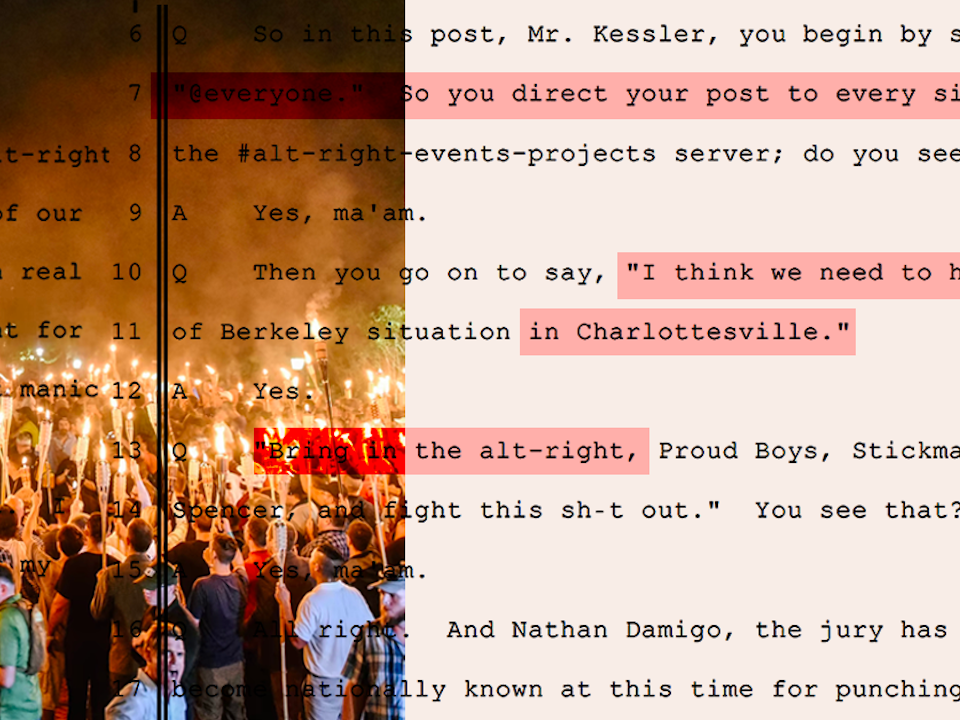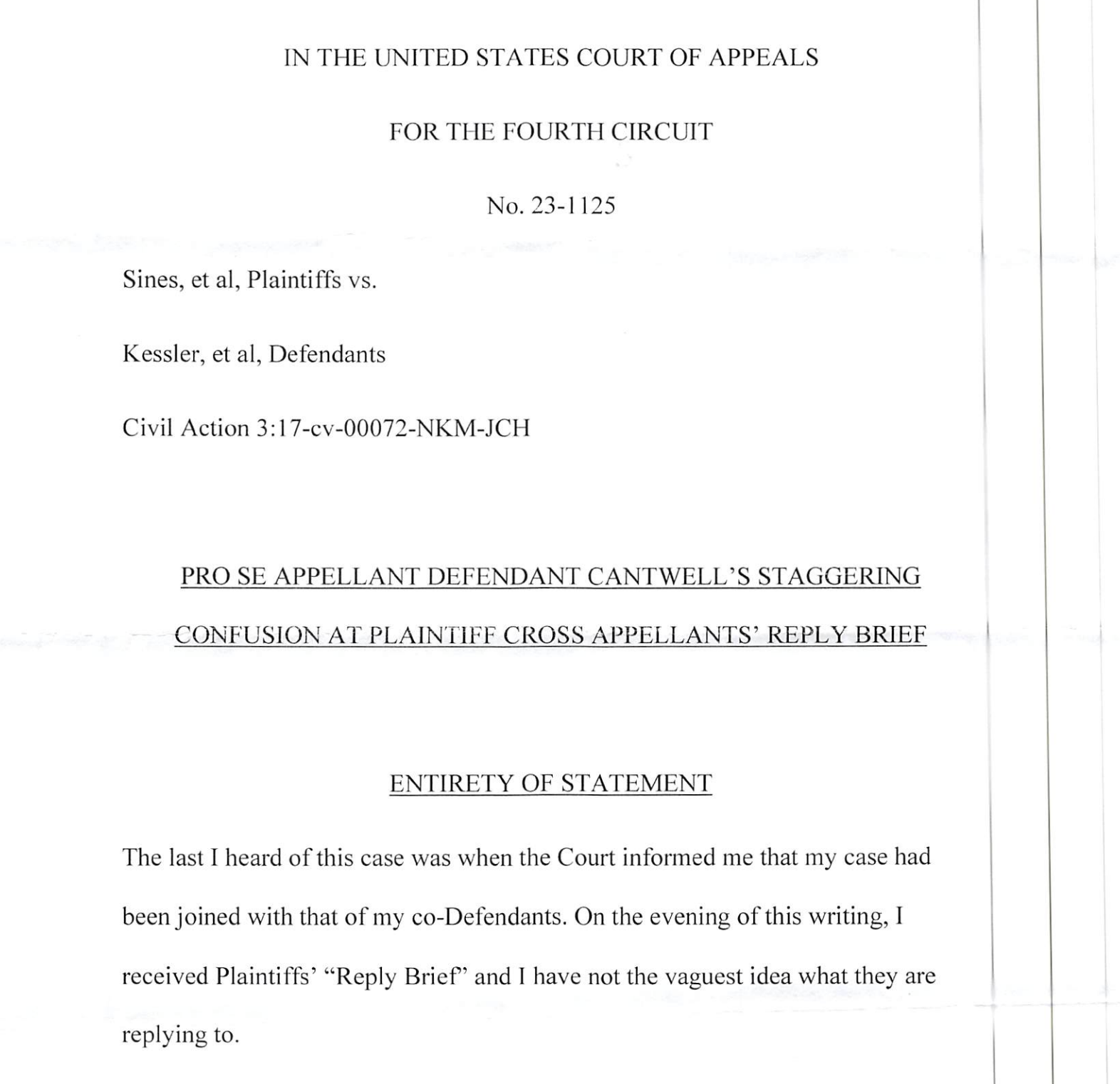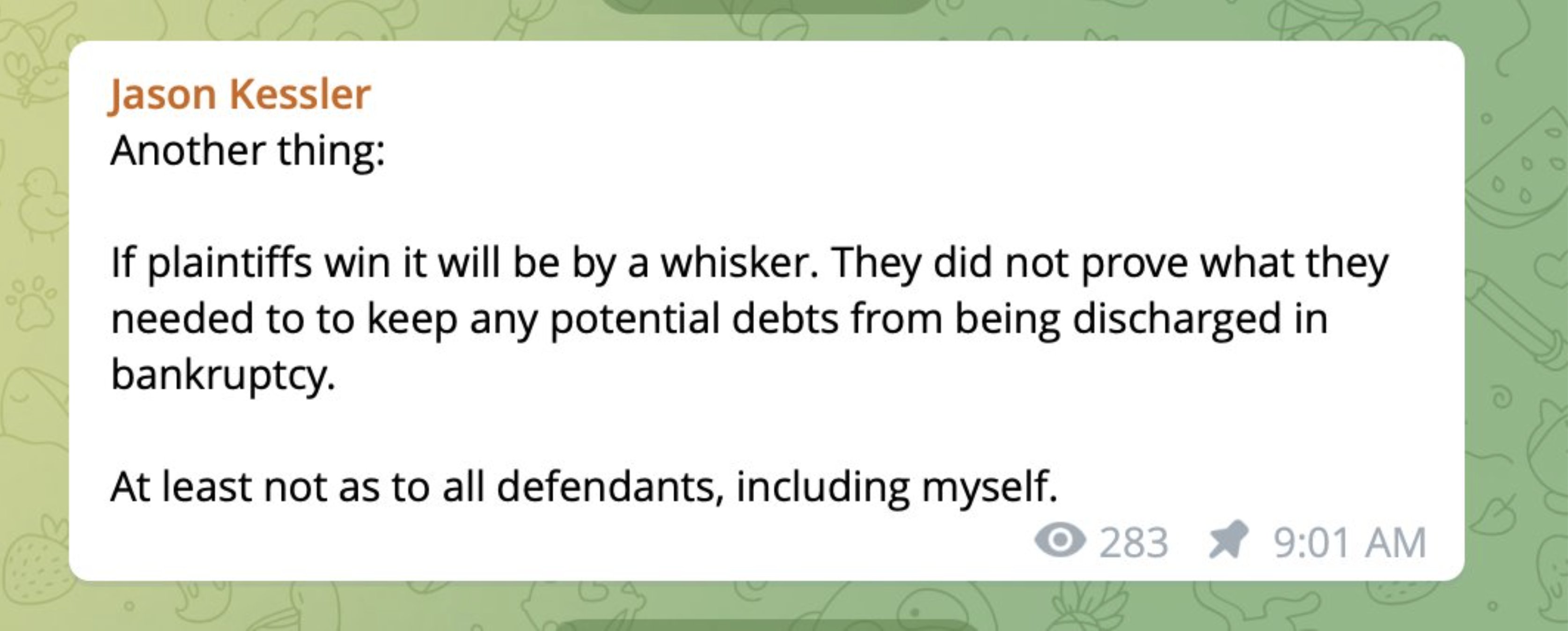Fourth Circuit Rules on Unite the Right Damages

The verdict is in… again. In November of 2021, a federal jury awarded $26 million in damages the plaintiffs in the Sines v Kessler lawsuit against the organizers of the deadly Unite the Right rally. A year later, those damages were slashed to just over $2 million. Today's Fourth Circuit ruling restores some of the punitive damages originally awarded by the jury.
The breakdown of that amount gets messy immediately. That original $26 million is made up of both compensatory and punitive damages, split across multiple claims, with portions of the amount applying only to particular plaintiffs or defendants. Compensatory damages are exactly what they sound like - they are intended to compensate a victim for actual losses. A plaintiff who incurred medical bills as a result of an injury, for example, has actually lost money out of their pocket as a result of the defendants’ actions and the compensatory damages are meant to compensate for that loss. Punitive damages, too, are exactly what they sound like - they are meant to punish the defendant and deter the defendant and anyone else from engaging in the same conduct. The Sines verdict was largely punitive damages. Of that top line amount, only $2 million was in compensatory damages. Of that $2 million, all defendants were jointly and severally liable for $1.3 million, with the additional $700,000 being James Alex Fields Jr’s responsibility alone. The remaining $24 million was all punitive damages.
A little over a year after the jury returned their verdict, Judge Norman Moon gave that damages award a significant haircut. A Virginia state statute caps punitive damages at $350,000 - a fact that juries are not allowed to be told. In a December 2022 opinion, Judge Moon wrote that the compensatory damages awarded would remain as-is, but the $24 million in punitive damages the jury awarded would be slashed to a total of $350,000. Attorneys for the plaintiffs appealed this ruling, arguing both that the statutory cap does not apply to this case at all and, if it does, it should be applied on a per-plaintiff basis, rather than to the suit as a whole.
The Fourth Circuit Court of Appeals heard oral argument on the matter on January 25, 2024. This, too, gets messy pretty quickly for non-lawyers (and, in my experience asking the lawyers in my life for assistance interpreting the federal rules of civil procedure, anyone who doesn’t practice a very particular kind of law). Not all defendants appealed. Not all defendants even showed up to the original trial. Several defendants appealed on the issue of joint and several liability for the compensatory damages. To cut right to the bare bones of what that means - imagine you and a roommate sign a lease. Your roommate never pays their half of the rent. The lease holds you both jointly and severally liable for the full amount of the rent. Your landlord doesn’t care whose bank account it comes out of, but the full amount is always due. So in this case, for that $1.3 million in compensatory damages for which all defendants were found liable, every defendant is on the hook for the full amount until that amount is paid in full, regardless of who pays. This was the grounds on which defendants Michael Hill, Michael Tubbs, the League of the South, and Nathan Damigo appealed and argued in January.
Other, more legally dubious and variously improperly filed appeals are lost in the ether, it seems. Christopher Cantwell’s last submission in a Fourth Circuit appeal he filed without the assistance of an attorney is titled “PRO SE APPELLANT DEFENDANT CANTWELL’S STAGGERING CONFUSION AT PLAINTIFF CROSS APPELLANTS' REPLY BRIEF” and has been sitting unanswered on the docket since last August.

In January, the Fourth Circuit heard defendant-appellants Damigo, Hill, Tubbs, and League of the South’s argument on joint and several liability as well as the plaintiff’s cross-appeal on the punitive damages cap. Today, five months later, the three judge panel issued an opinion authored by Judge Diaz. The Fourth Circuit affirms the district court ruling on joint and several liability and vacates the district court ruling on the damages cap. That statutory cap was enacted in 1987, eight years before Virginia amended the rules to allow multi-plaintiff civil actions. It is obvious to the court that the legislature did not contemplate multi-plaintiff actions when the damages cap was passed and interpreting that cap as being per-case rather than per-plaintiff would only incentivize plaintiffs to file suit separately, which in this case would have meant the court would have held nine separate trials. The opinion remands the case back to the district court with instructions to apply the damages cap on a per-plaintiff basis instead.
Judge Diaz, writing for the panel, seems to acknowledge that, while required by statute, this reduced damages award isn't the justice plaintiffs deserved, ending the opinion with these words:
Over two years ago, the jury used its $24 million punitive damages award to send an unmistakable message to the defendants and to the public about the outrageous misconduct that took place in Charlottesville, Virginia. While the law compels us to reduce the award, it’s long past time for that message to be delivered.
Now the case will come back to Judge Moon in the Western District of Virginia for a new judgment order, this time applying the punitive damages award on a per-plaintiff basis, meaning each plaintiff can be awarded up to $350,000 of the punitive damages the jury awarded, rather than all plaintiffs splitting a total of $350,000. Judge Moon’s order will sort out the finer points on the math, but we can look to the original judgment for some clue. When the total punitive damages were capped at $350,000, Judge Moon allocated the share of responsibility for each defendant based on the counts for which they were found liable for punitive damages, with organizational defendants being liable for twice the amount as individual defendants. That broke out as follows:
- $182,291.68 for Fields;
- $14,583.33 for each of Vanguard America, League of the South, Identity Evropa, Traditionalist Worker Party, and National Socialist Movement;
- $10,208.33 for each of Kessler, Spencer, Cantwell, Ray, and Kline;
- $7,291.67 for each of Damigo, Heimbach, Parrott, Hill, Tubbs, and Schoep
The Fourth Circuit opinion refers to “the eight plaintiffs” who sought punitive damages. While the jury did attempt to award punitive damages to all nine plaintiffs, there is one plaintiff for whom the only punitive damage award was assigned on a claim for which that plaintiff received no compensatory damages. Without compensatory damages, statute prohibits the award of punitive damages. As for how Judge Moon will reallocate the pro-rata liabilities with the new cap applied, it's possible he will just multiply the amounts in his earlier ruling by eight to arrive at the new per-plaintiff capped amounts.
Plaintiffs’ counsel may also ask to revisit this post-trial ruling in which Judge Moon denied a motion for additional punitive damages against the defendants who defaulted in the case. Defendants Andrew Anglin, Anglin’s company Moonbase Holdings, the East Coast Knights of the KKK, the Fraternal Order of the Alt-Knights, August Sol Invictus, The Loyal White Knights of the KKK, and Nationalist Front all failed to participate in the proceedings. The default judgments against those defendants make them jointly and severally liable for the compensatory damages, but Judge Moon ruled they could not be held liable for any punitive damages or prejudgment interest.
The amount defendants have been found liable for does not include the attorney’s fees and costs the judge also awarded plaintiffs’ counsel. A brief peek at the docket shows this May 2020 order for Matthew Heimbach, Elliott Kline, and Vanguard America to pay a total of $41,300 for costs associated with their refusal to obey court orders in discovery; this post-trial order for defendants to pay nearly $1.3 million in costs associated with discovery; and this post-trial order holding defendants responsible for $3.18 million in attorney’s fees and $468,000 in costs.
So now we wait a little longer. Once Judge Moon’s new judgment is on the books, we may start to see plaintiffs’ counsel make moves to actually begin recovering some of the money owed. Defendant Nathan Damigo filed for bankruptcy in January 2019, but that proceeding has been in limbo pending the outcome of the lawsuit. Once a final judgment order is entered, attorneys for the Sines plaintiffs will argue in a California bankruptcy court that this is not a dischargeable debt. Opinions vary as to whether this type of civil judgment is dischargeable, but a text produced in discovery in the Sines lawsuit will probably end up hurting him - he admits to filing for bankruptcy with the explicit purpose of getting out of the lawsuit.

Jason Kessler may be waiting to see what comes of that hearing. Before the jury had even reached their verdict in 2021, Kessler posted very confidently that even if the plaintiffs prevailed, the judgment could be discharged in a bankruptcy proceeding.

This case, originally filed in October 2017, isn’t quite over yet.
